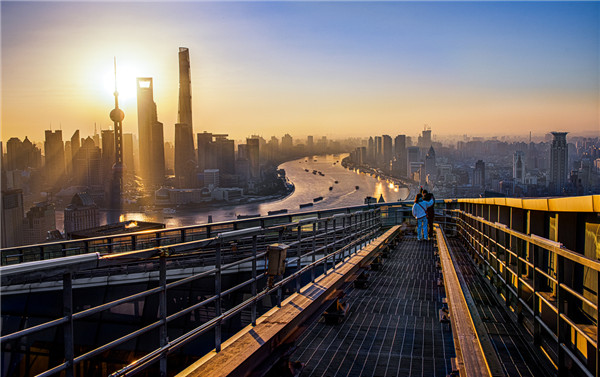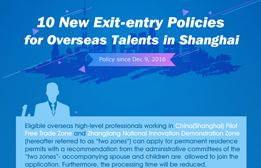Shanghai a magnet for global sci-tech talents

A view of the Bund and the Lujiazui financial area in Shanghai from the roof of the CITIC Plaza on Jan 1, 2021. [Photo by Fang Zhonglin/for China Daily]
Shanghai, a scientific and technological (sci-tech) innovation center in China, has been a magnet for global sci-tech talents for its all-embracing city spirit, its profound sci-tech background, as well as its first-rated education and medical resources, according to Jiang Xuefeng, a chemist and a professor at East China Normal University (ECNU) in Shanghai.
Jiang grew up in Lanzhou, Gansu province and went to the Shanghai Institute of Organic Chemistry of the China Academy of Sciences (CAS) to further study after finishing his undergraduate education. He also chose to return to Shanghai and work at ECNU, despite many other domestic institutions giving him job offers, after finishing his post-doctoral research abroad.
He was soon included in the A Type of the Shanghai Pujiang Talent Program, a talent program for returned overseas personnel. Three years later, Jiang was included in the Shanghai Rising-Star Program, a program aimed at selecting and nurturing outstanding young sci-tech talents.
Jiang said that he was drawn to Shanghai by the city's sci-tech strengths, as well as the strong support it has been giving to young scientists.
In terms of attractiveness to young scientists under 30 years old, Shanghai was ranked fourth among 20 global innovative cities, including New York, London, and Tokyo, according to the 2021 Ideal City–Global Young Scientists Survey Report by the Shanghai Institute of Science and Springer Nature Group.
Jiang's research in sulfur chemistry is important to the fields of bio-medicine, new materials, and life sciences. Shanghai has been home to well-developed related industrial clusters, as well as related basic research, making it an ideal place for multidisciplinary collaboration and innovation, he said.
Jiang's team has worked with many kinds of enterprises involving medicine, materials, fine chemicals, and flavoring matters due to the wide application of sulfur chemistry. Thanks to the excellent job he has done in basic research, Jiang was included in the Shanghai Rising-Star Program in 2015. With the support of the program, he has led his team to a series of innovative achievements. In 2018, he was awarded Sulfur on the Periodic Table of Younger Chemists by the International Union of Pure and Applied Chemistry, a high honor in the sulfur chemistry field.
Jiang also made contributions to the R&D of anti-viral drugs for COVID-19. He worked with Rao Zihe, an academician of CAS, and his team to discover many novel small molecule compounds related to anti-coronavirus drug target 3CL, a significant step for new drug research and development.
Shanghai has also attracted many other rising stars like Jiang. Over 3,000 young sci-tech talents have joined the Rising-Star Program, a cradle for high-level talented personnel, and enjoyed the program's benefits. Among the rising stars, there have been 17 academicians of the Chinese Academy of Sciences and Chinese Academy of Engineering, 188 included in the National Science Fund for Distinguished Young Scholars, 106 included in the Yangtze River Scholar Program, and 152 included in the National Science Foundation for Outstanding Young Scholars.
The outstanding result was attributed to the city's stronger support for the program. The fund for each person was doubled to 400,000 yuan ($61,511). The number of people included in the program was also doubled from 100 to 200 per year.
Additionally, the Pujiang Talent Program has attracted 4,437 high-level returned overseas personnel.
Those programs not only provide scientific funds for the recipients, but also build multidisciplinary collaboration and industry-university-research cooperation platforms for them, helping the city attract and retain talented personnel.
Participants often say they feel a sense of belonging when attending the activities organized by the rising-star association. Jiang noted that the association gathered together all the participants of the Rising-Star Program, which includes young researchers at universities, research institutes, as well as enterprises, and helped build up friendship and cooperation among them via activities like symposiums, making contributions to Shanghai's goal of developing into a sci-tech innovation center.
Apart from Shanghai's sci-tech strengths, the city's all-embracing spirit that there is no regional discrimination and everyone is equal, its strong governance capacity as exemplified by its handling of the COVID-19 epidemic, as well as its first-rate education and medical resources are all valued by talented personnel.

 Print
Print Mail
Mail




